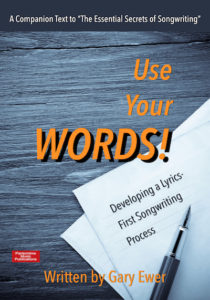While browsing about on YouTube recently I listened to one of my favourite Bruce Springsteen songs, “Tunnel of Love” (1987) from the album of the same name. I loved reading through the comments on the page, because it was obvious that other people love the tune as much as I do.
I want to talk about lyrics here, but as an aside, I also want to say how well the production of this song has withstood the test of time. Sure, it’s got 80s written all over it, but it’s done so well, and is so supportive of the intent of the song, that it still sounds amazing today.
 “Use Your Words! Developing a Lyrics-First Songwriting Process” is a must-read for any songwriter who’s working toward making lyrics the most powerful part of their music. Right now it’s FREE with your purchase of “The Essential Secrets of Songwriting 10-eBook Bundle”
“Use Your Words! Developing a Lyrics-First Songwriting Process” is a must-read for any songwriter who’s working toward making lyrics the most powerful part of their music. Right now it’s FREE with your purchase of “The Essential Secrets of Songwriting 10-eBook Bundle”
There was one comment on that page that caught my eye for its brevity: “This is one of his best ! I can relate.”
And that comment probably best sums up what a great lyric does. It puts you — the listener — in the picture, in a way that even though you know Springsteen is singing it, it sounds like he’s taken something from your own life and has set it to music.
There are other comments on that page that would, I imagine, bring a smile to Springsteen’s face:
- “Just one of those songs where you forget everything and just take a ride.”
- “you actually feel the song right into your heart…”
- “chills even after all these years”
Then there are all the people who mentioned this line from the lyric: “You’ve got to learn to live with what you can’t rise above…”
And then back to that comment, “I can relate-” If nothing else, that’s what you aim for in a good lyric.
As you work your song from main topic (category) down to something more specific and unique, it’s the dream of every songwriter to have a listener able to say, “I can relate.”
To write a lyric that reaches in and touches the emotional soul of your audience, usually all of the following needs to be true:
- The topic is universal, and relatable for that reason. You’re writing about something that most people will have experienced in their own lives, whether it’s an event, a state of mind, or an opinion.
- The language you use in the lyric sounds like it might have been extracted from a casual conversation. The everyday nature of the words and phrases that Springsteen uses makes having an emotional response easy.
- The lyric has powerful, imaginative lines that say more than what they literally say. Every great lyric has those lines that sum everything up beautifully — the so-called pay-off line. But then there are others, and “Tunnel of Love” has some especially powerful ones:
- “Then the lights go out; it’s just the three of us
Yeah, you me and all that stuff were so scared of” - “There’s a room of shadows that gets so dark, brother
Its easy for two people to lose each other” - “But, this house is haunted and the ride gets rough”
- “Then the lights go out; it’s just the three of us
For me, those powerful lines that stand above the others is what great lyricists are able to create. That “lights go out” line, where he describes fears in a relationship as one of the “three of us” — that’s really powerful, and a particularly unique way of looking at romantic life.
The best way to improve your lyrics is to take a great lyric and experience it. Think of the number of ways the writer could have worded their thoughts — the number of ways that any particular song lyric might have been written. And compare that with what the writer eventually chose.
But before even that step, you need to know that you’ve chosen a category and topic that has the possibility of being relatable – of touching the inner soul of the audience.
 Written by Gary Ewer. Follow Gary on Twitter
Written by Gary Ewer. Follow Gary on Twitter
 Chapter 5 of “The Essential Secrets of Songwriting” is where you’ll discover the secrets of writing a melody that partners well with a song lyric. Right now, get a copy of “Use Your Words! Developing a Lyrics-First Songwriting Process” FREE with your purchase of the 10-eBook Bundle.
Chapter 5 of “The Essential Secrets of Songwriting” is where you’ll discover the secrets of writing a melody that partners well with a song lyric. Right now, get a copy of “Use Your Words! Developing a Lyrics-First Songwriting Process” FREE with your purchase of the 10-eBook Bundle.










